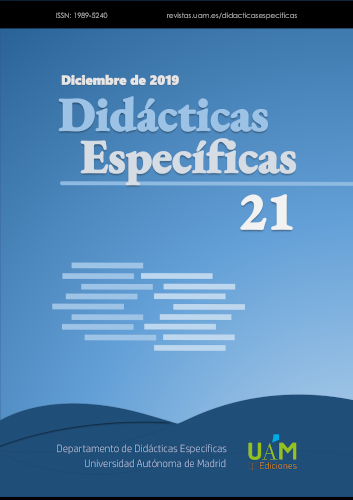Analysis of teaching questions in a water cycle research environment
DOI:
https://doi.org/10.15366/didacticas2019.21.003Keywords:
Questions, Water cycle, PrimaryAbstract
This paper is about a case study in which a future teacher carries out an investigative activity on the water cycle in a Primary classroom. The analysis focuses on examining the type of guidance done by the future teacher through the questions. The results show how the planning of a series of questions serves the future teacher as a form of control towards a structure to be adhered to. Among the difficulties encountered, the lack of questions aimed at establishing relationships between a physical-chemical model of state changes stands out.Downloads
References
BROUSSEAU, G. (2006): "Theory of didactical situations in mathematics: Didactique des mathématiques": Springer Science & Business Media, 19, pp. 1970-1990.
BROWN, K. B. (2012). "Seeking Questions, Not Answers: The Potential of Inquiry-Based Approaches to Teaching Library and Information Science". Journal of Education for Library and Information Science, 53 (3), pp. 189-199.
CHIN, C. (2007). "Teacher Questioning in Science Classrooms: Approaches that Stimulate Productive Thinking". Journal of Research in Science Teaching, 44 (6), pp. 815-843. https://doi.org/10.1002/tea.20171
CRUJEIRAS PÉREZ, B. y JIMÉNEZ ALEIXANDRE, M. P. (2015). "Desafíos planteados por las actividades abiertas de indagación en el laboratorio: articulación de conocimientos teóricos y prácticos en las prácticas científicas". Enseñanza de las ciencias, 33 (1), pp. 63-84.
DILLON, J. T. (1982). "The effect of questions in education and other enterprises". Journal of Curriculum Studies, 14 (2), pp. 127-152. https://doi.org/10.1080/0022027820140203
DOMÈNECH CASAL, J. (2014). "Una secuencia didáctica de modelización, indagación y creación del conocimiento científico en torno a la deriva continental y la tectónica de placas". Revista Eureka sobre Enseñanza y Divulgación de las Ciencias, 12 (1), pp. 186-197. https://doi.org/10.25267/Rev_Eureka_ensen_divulg_cienc.2015.v12.i1.13
FORERO SÁENZ, AMPARO (2014). "El uso de las preguntas por parte del docente en la clase de matemáticas y sus efectos en las respuestas y conversaciones de los niños (Tesis Doctoral)". Universidad Autónoma de Barcelona, Barcelona, España.
GIL, M. J., MARTÍNEZ, B., DE LA GÁNDARA, M., CALVO, J. M. y CORTÉS, A. L. (2008). "De la universidad a la escuela: no es fácil la indagación científica". Revista Interuniversitaria de Formación del Profesorado, 63 (22), pp. 81-100.
HUFFMAN, D., & KALNIN, J. (2003). "Collaborative inquiry to make data-based decisions in schools". Teaching and teacher education, 19 (6), pp. 569-580. https://doi.org/10.1016/S0742-051X(03)00054-4
KAWALKAR, A., & VIJAPURKAR J. (2013). "Scaffolding science talk: The role of teachers questions in the inquiry classroom". International Journal of Science Education, 35 (12), pp. 2004-2027. https://doi.org/10.1080/09500693.2011.604684
KOUFETTA-MENICOU, C., & SCAIFE, J. (2000). "Teachers' questions-types and significance in science education". School Science Review, 81, pp. 79-84.
LEMKE, J.L. (1997). Aprender a hablar ciencia. Lenguaje, aprendizaje y valores. Barcelona: Paidós.
LINN, M. C., GERARD, L., RYOO, K., MCELHANEY, K., LIU, O. L., & RAFFERTY, A. N. (2014). "Computer-guided inquiry to improve science learning", Science, 344 (6180), pp. 155-156. https://doi.org/10.1126/science.1245980
MARQUÉZ BARGALLÓ C. M., y ROCA TORT, M. (2009). "Plantear preguntas: un punto de partida para aprender ciencias". Revista Educación y pedagogía, 18 (45), pp. 61-71.
MÁRQUEZ C., IZQUIERDO, M. y ESPINET M. (2003). "Comunicación multimodal en la clase de ciencias: el ciclo del agua", Enseñanza de las Ciencias, 21 (3), pp. 371-386.
MARTIN-DUNLOP, C. S. (2013). "Prospective elementary teachers' understanding of the nature of science and perceptions of the classroom learning environment", Research in Science Education, 43 (3), pp.873-893. https://doi.org/10.1007/s11165-012-9290-5
NATIONAL RESEARCH COUNCIL. (2012). A framework for K-12 science education: Practices, crosscutting concepts, and core ideas. National Academies Press.
OMARIAH, O. (2009). "Teachers' Questioning Techniques and Their Potential in Heightening Pupils' Inquiry". International Conference on Primary Education. Proceedings.
OTERO, S. y CRUJEIRAS, B. (2016). "Indagación en el laboratorio de física de secundaria: ¿cuáles serían las mejores condiciones para hacer kayak?". ReiDoCrea, 5, pp. 235-246.
RICHARD. W. P. (1989). "Critical thinking in North America: A new theory of knowledge, learning, and literacy", Argumentation, 3 (2), pp. 197-235. https://doi.org/10.1007/BF00128149
SENSEVY, G. (2011). Le sens du savoir. Éléments pour une théorie de l'action conjointe en didactique. Bruxelles: de Boeck. https://doi.org/10.3917/dbu.sense.2011.01
TIBERGHIEN, A., & SENSEVY, G. (2012). The nature of video studies in science education. In Science education research and practice in Europe, pp. 141-179. Sense Publishers, Rotterdam. https://doi.org/10.1007/978-94-6091-900-8_7
VÍLCHEZ GONZÁLEZ, J. M. y BRAVO TORIJA, B. (2015). "Percepción del profesorado de ciencias de educación primaria en formación acerca de las etapas y acciones necesarias para realizar una indagación escolar". Enseñanza de las Ciencias, 33 (1), pp. 185-202.
WINDSCHITL, M. (2003). "Inquiry projects in science teacher education: What can investigative experiences reveal about teacher thinking and eventual classroom practice?". Science Education, 87 (1), pp. 112-143. https://doi.org/10.1002/sce.10044



